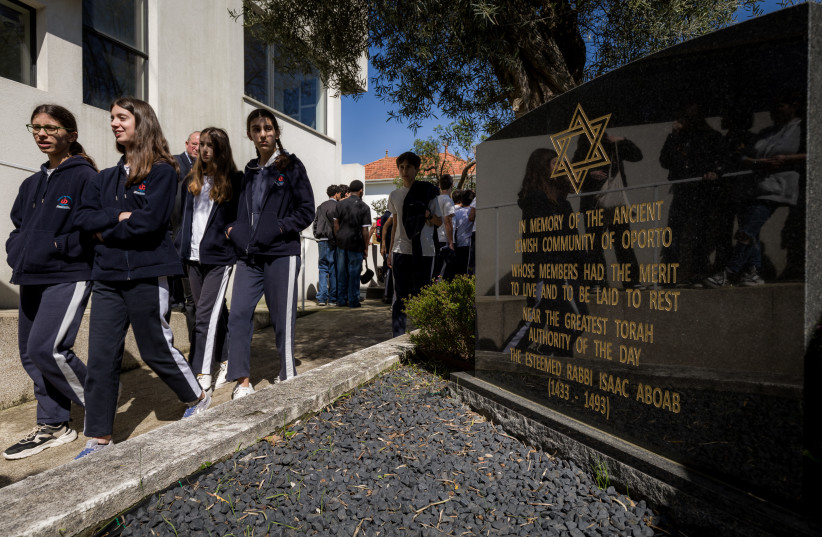Approximately 1,000 Portuguese students from all over the country visited the Jewish Museum of Porto, on Wednesday to commemorate the National Memorial Day for the Victims of the Inquisition, the Porto Jewish community announced.
Their visit included a recently inaugurated memorial bearing the names of hundreds of victims of the Inquisition, an event infamous for its persecution of Jews and Muslims in Spain, Portugal, and later, in Latin America.
The students attended the event at the Jewish Museum of Porto, marking National Memorial Day. This year, it was moved to March 20 from its usual March 31 date because it coincides with Catholic Easter Sunday.
Although the museum covers Jewish history around the world, particularly in Portugal, the museum especially highlights the period of the Inquisition.
In the portion of the museum dedicated to this period, there is a replica of a prison coach and the famous 17th-century book “Sentinela Contra os Judeus,” a book that says that Jews have tails. There is also a memorial that records the names of 842 victims born in Porto, measuring four meters wide by two meters high.

Cecília Cardoso, accused of Judaising heresies, was the oldest citizen in Porto to be persecuted by the Inquisition when she was 110. One of the younger victims included a 10-year-old child as well as several members of the Espinosa family, who confronted Porto's religious tribunal and its methods of torture in the years 1544, 1620 and 1624.
The famous Jewish philosopher Baruch Spinoza was born in Amsterdam shortly after this period. He was the son of parents who had abandoned Portugal in search of a safe haven. Many Portuguese Jews who fled the Inquisition settled in Amsterdam.
Scenes from movie on the Inquisition shown
The Jewish Museum’s theater showcases scenes from the film “1618,” which itself centers on the Inquisition in Porto. The film was produced by the Porto Jewish community in 2019 and has won the most international awards of all Portuguese films.
Michael Rothwell, director of the Jewish Museum of Porto, recalled that the Portuguese Inquisition lasted from 1536 to 1821. “For almost three centuries, a religious belief was forbidden. In the history of humanity, there has never been such a systematic and lasting persecution due to such an innocent cause on any continent,” he said.
The Jewish Museum of Porto is open to school trips and the Jewish communities in Portugal and worldwide. It is not open to the general public, except on the European Day of Jewish Culture, on the first Sunday in September of each year, because Portuguese authorities have not provided security for the venue, claiming that security is not required, even if paid for by the community.
Rothwell explained, “In a Europe with open borders where Jews are a target, we decided not to open to the public, for sooner or later there would be an attack.” Porto has experienced a new wave of antisemitism since the October 7 attacks.
The Porto Jewish community also operates a Holocaust Museum, which was opened in December 2020 and has already been visited by some 150,000 teenagers from schools in Portugal, about 15 percent of the country’s teenage population.
“The two museums complement each other admirably. The Holocaust Museum focuses on the 20th century while the Jewish Museum portrays the presence of the Jews in Portugal from two millennia ago to the 21st century,” Rothwell added.
